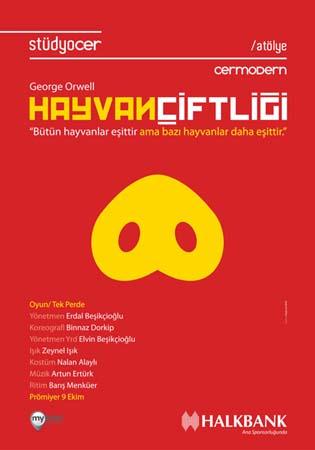LIVING ANALOGIES
"Theater is doomed to die out with the ever-increasing popularity of the film industry and the improvements in the techniques of movie making." My father's opinion, which I was so willing to protest against, yet knew deep inside was true. Looking at members of my own generation, it's impossible not to notice that a fairly high percentage of people choose to go to a movie or watch a TV series rather than see a play. Distinguishing myself from this group, up until last week I was among those who say the reason they don't go to the theater is, "There aren't enough plays to go to in Ankara!" Fortunately I had a chance to see two productions -- one cabaret and one play -- that made me change not only my opinion on the number of plays in Ankara but also my ideas about what kinds of activities I might want to do in my free time. In addition, I think it's worth noting that I was really lucky to see both Brecht and an adaptation of "Animal Farm."
 I've always admired Genco Erkal as an actor, especially for his performance in the "Nazım Hikmet Oratorio." In productions that are based on the lives of historical figures, the beauty of the work comes from the success of the lead in not just acting, but being the person he is portraying. Having been moved in this way by his earlier performance, I didn't think twice about going to see "I Am Bertolt Brecht: A Cabaret" when I found out that Erkal was the male lead. So at 7 p.m. on October 14, I knew that this was going to be a spectacular performance, even though I wasn't familiar with Brecht, a twentieth-century poet and playwright.
I've always admired Genco Erkal as an actor, especially for his performance in the "Nazım Hikmet Oratorio." In productions that are based on the lives of historical figures, the beauty of the work comes from the success of the lead in not just acting, but being the person he is portraying. Having been moved in this way by his earlier performance, I didn't think twice about going to see "I Am Bertolt Brecht: A Cabaret" when I found out that Erkal was the male lead. So at 7 p.m. on October 14, I knew that this was going to be a spectacular performance, even though I wasn't familiar with Brecht, a twentieth-century poet and playwright.
That evening, I watched a man suffering because of his failure to make it known to the public that he -- they all -- deserved better. The topic being a common one, there was one thing about Brecht that made the cabaret -- it had pieces from most of his works -- so memorable. The playwright's analogies were so simple and most of the time so obvious that they made the audience members stop and say, "Why didn't I think of that?!" But as simple as they were, they were nonetheless powerful enough to make some burst into laughter and others into tears.
After doing some research on my latest discovery, I've learned that Brecht viewed the theater as a forum in which political ideas are expressed by the playwright. One of the best-known aspects of his "epic theater" is the staging method, which makes audience members completely aware of the fact that they are watching a play. In this way, they remain observers, not allowed to jump into the reality of the story, and so become aware of their place and role in the political system and desirous of changing this.
Only a few days after seeing "I Am Bertolt Brecht," wishing to have another such experience, I went to a play adapted from George Orwell's "Animal Farm." Although I've read the book and was thus familiar with the story, it wasn't until after the performance that I realized the two plays I had seen were on the same topic. They were both asking -- begging -- the audience to recognize what was being done to them by the authorities, the people whom they trusted  with their lives. Not being able to give "Animal Farm" the detail it deserves due to the column's length limit, it will suffice to say that it is the one of the briefest but yet most powerful summaries of human history one can imagine.
with their lives. Not being able to give "Animal Farm" the detail it deserves due to the column's length limit, it will suffice to say that it is the one of the briefest but yet most powerful summaries of human history one can imagine.
As a final word, I want to add that I'm almost sure that there are more people familiar with "Animal Farm" than with Brecht's plays; and even more sure that when leaving the theater after performances of the prior, the playgoers were all thinking how great his analogies were: "Using animals to represent people? I certainly wouldn't have come up with that. George Orwell -- he really was a genius."
When it comes to conveying a message, it's quite interesting that both really obvious and more obscure analogies may have the same effect on the audience. Seeing the pigs of the farm standing on two feet as opposed to the four they started with when they were not in charge was no less interesting than hearing Brecht's seesaw analogy, which reminds one that the weight of the lower side must be greater than that of the upper side for the platform to be stable.
All in all, there is so much to be explored outside our living rooms, and although you may not be as carried away as I was, you could still end up feeling that going to a play is an hour or two well spent.
P.S. The performance schedule for "I Am Bertolt Brecht" can be reached via the following link: http://dostlartiyatrosu.com/program.html
-1.jpg)